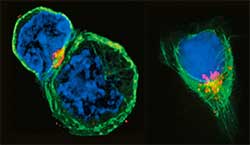Harnessing the Immune System to Fight Cancer:
A symposium to honor Jim Allison
UC Berkeley
March 28, 2012
 Department of Molecular & Cell Biology and
Department of Molecular & Cell Biology and
Cancer Research Laboratory
University of California, Berkeley
Wednesday, March 28, 2012
9:00 AM - 5:00 PM
Li Ka Shing Center for Biomedical and Health Sciences
In the 1990s, basic research carried out in Jim Allison's lab at Berkeley led to the discovery that a key molecule called CTLA-4 could "put the brakes" on immune responses. Jim's lab then developed a monoclonal antibody to CTLA-4, and using mouse models, showed that the antibody could "take the brakes off" of existing immune response against tumors, thus providing an effective anti-tumor therapy that was effective against many different types of tumors. In 2010, Ipilimumab a monoclonal antibody to CTLA-4 that had been developed for use in humans, was the first drug ever to show survival benefit in a phase III clinical trials of late stage melanoma and in 2011 was approved for the treatment of patients with metastatic melanoma. This work provides an inspiring example of how basic scientific discovery can lead to life-saving medical advances.
On Wed, March 28, 2012 on the UC Berkeley campus, we will honor Jim Allison and his remarkable accomplishment, with a day of talks ranging from basic immunology to clinical aspects of cancer immunotherapy by a highly talented and distinguished group of investigators (including Jim). Hope to see you there.
JIM ALLISON, Memorial Sloan-‐Kettering Cancer Center, New York, New York
"Immune Checkpoint Blockade: New Insights and Opportunities"
GLENN DRANOFF, Dana-‐Farber Cancer Institute, Boston, Massachusetts
" Mechanisms of Protective Tumor Immunity”

PHIL GREENBERG, University of Washington, Seattle
" Engineering cells for tumor therapy: Getting T cells all dressed up and ready to kill”
MAX KRUMMEL University of California, San Francisco
" Defining the Path from Tumor Antigens to T cell Tolerance"
DAVID RAULET University of California, Berkeley
" How innate mechanisms enable killer cells to detect cancer cells"
BOB SCHREIBER, Washington University, St. Louis
" Cancer Immunoediting: Underlying Mechanisms and Therapeutic Implications”
PADMANEE SHARMA, University of Texas MD Anderson Cancer Center, Houston, Texas
" Investigating the ICOS/ICOSL pathway as a target to improve anti-‐CTLA-‐4 therapy”
JEDD WOLCHOK, Memorial Sloan-‐Kettering Cancer Center, New York
" Ipilimumab in the Treatment of Metastatic Melanoma: Proof of Principle for Checkpoint Blockade"
There is no cost to attend but space is limited.
Click Here to Register
Download the Symposium Flyer PDF
Organizations that have contributed funding:
| Department of Molecular and Cell Biology |
| Cancer Research Laboratory, UC Berkeley |
For questions contact Judith Yee at 510-642-4714 or jhyee@berkeley.edu or Reba Gray at 510-642-4711 or reba@berkeley.edu